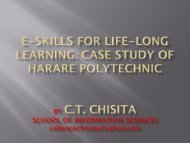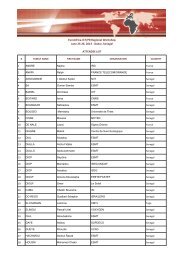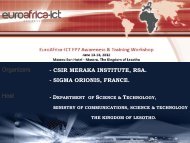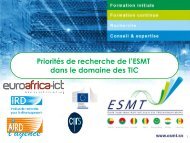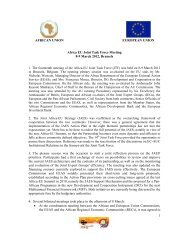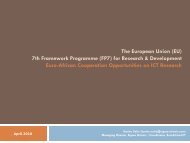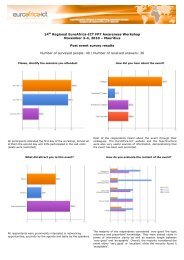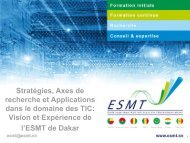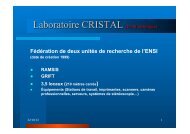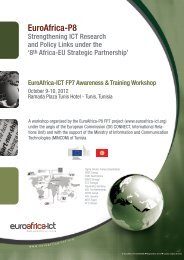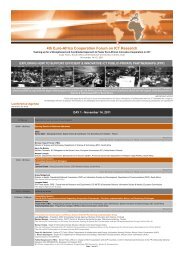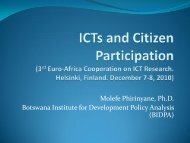part 1 - EuroAfrica-ICT
part 1 - EuroAfrica-ICT
part 1 - EuroAfrica-ICT
Create successful ePaper yourself
Turn your PDF publications into a flip-book with our unique Google optimized e-Paper software.
Ecosystems, Societies, Consilience, Precautionary principle: Development of an assessment methodof the societal cost for best fishing practices and efficient public policiesPeriod: 01/01/2005 to 31/12/2008Budget from EC: EUR 3 100 000website: www.ecostproject.orgThe main aim of the ECOST project is to develop a newapproach to assess the societal cost of fishing activities andfishing policies. Societal cost are defined as all costs linkedto fishing activities: these may be ecological (alterationof the capacity of a system), economic (all costs linked toproduction, management, subsidies, and external factors),social (linked to choices made in public policy, foodsafety, provision for national or international markets, theeradication of poverty, and to development models [smallscale fishing versus industrial fishing]).The project has to be seen from the wider perspective ofequipping public decision-makers and society with theappropriate tools and methods needed to take into account,not only immediate economic and social profits, but alsothe costs engendered by fishing activities which relate asmuch to ecosystems as to societies.The geographical dimension of the work is spread overthree continents (three countries for each continent) thatare characterised respectively by ecosystems of coastalupwelling (West Africa), delta (South East Asia) and coralreef (Caribbean). Within each region/ecosystem (eco-region)several fisheries have been selected as representative ofglobal fishing activities. Furthermore, a marine-protectedarea will be chosen in order to establish comparativeanalysis within the said eco-region and to serve as areference point. There is a triple advantage to such a choiceas it will facilitate the comparison of: first, the differentecosystems; second, fishing methods and management(public policy); and third, societies based on the choicesthey have made and their preoccupations regarding variousmarine resources. The main body of the work will thereforefocus on the development of a model that addresses thesocietal cost of fishing activities, which can reflect the realityof such varied and contrasting coastal regions as perceivedvia their ecosystems and societies.At the heart of the project will be the triple theme of‘marine environment — fishing activities — civil society’thus bringing together life and social science. The multidisciplinarynature of the project is centred on the conceptCoordinator: Dr Pierre FaillerUniversity of Portsmouthof consilience in order to gain a better understanding ofsituations that require expertise in different areas ofcompetence. of traditional models to take into account the realityof ecological, economic and social effects using purelytheoretical considerations, past application experience,and questioning the notion of value. A theoretical studyof the strengths of these models cannot be separatedfrom an in-depth study of the values of nature (resourcesand functions) that underlie the present models. Thiswork on the conception of value is fundamental to thedefinition of societal costs — costs and values are twosides of the same coin. The result of this first stage ofthe work (WP1) will be a report on significance usingdifferent models until the present time. The report willalso examine the notion of value to be considered whenmeasuring the societal cost of fishing activities. cost. This model is founded on the close association ofeconomics and ecology. It is constructed using a modelwhich currently has the greatest potential for applicationin the domain of fishing because it takes into account thevariable nature of resources and marine environmentalchanges. Furthermore, it is able to acquire a dynamicdimension, which is necessary for any prospective onpublic policy. The measurable result will therefore be adynamic model that has environmental retro-actions inrelation to the ecosystem (WP5 and WP6). To developthis model, scientists will first work in their own field(WP2, WP3, WP4) in an interactive way in order to makeprogress. social impact. First, this will be a revision of the modelaccording to the lessons learnt from its experimentalapplication to the three chosen regions/ecosystems.Second, it will consist of a multi-disciplinary study ofthe biological, ecological, and economic factors thatmay limit the wider application of the model to otherNatural Resources



